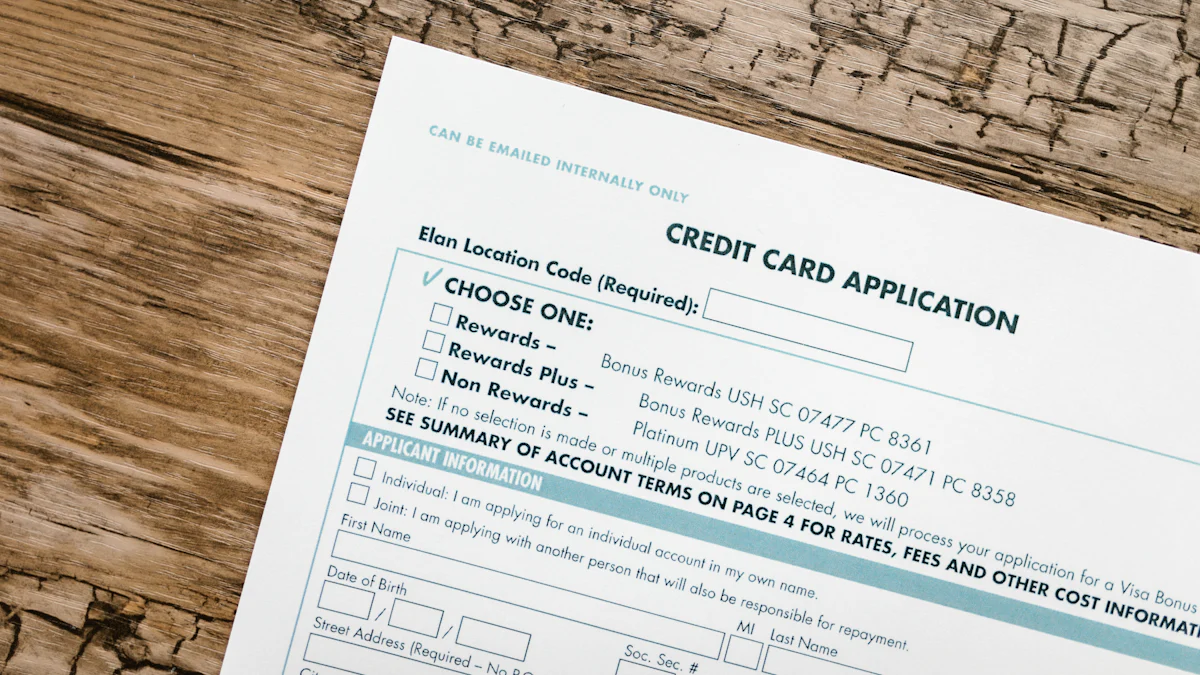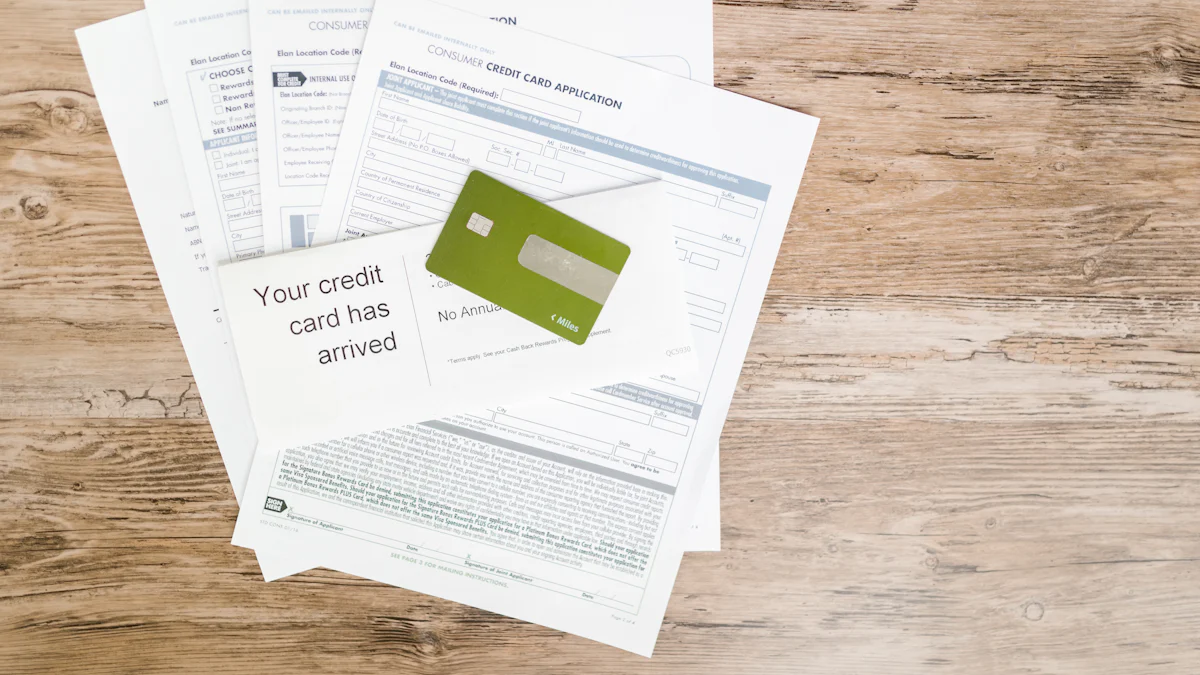How to Qualify for Credit Cards by Rebuilding Credit

How to Qualify for Credit Cards by Rebuilding Credit
Image Source: pexels
Rebuilding your credit opens doors to better financial opportunities. It helps you qualify for credit cards and regain control of your finances. With consistent effort, you can achieve this goal. Start by learning how to improve credit score for credit card approval. Every small step you take today builds a stronger financial future tomorrow.
Key Takeaways
-
Fixing your credit score helps you get better credit cards. A good score means lower fees and better deals.
-
First, look at your credit report for mistakes. Fixing errors can raise your score and help you get approved.
- Always pay your bills on time. This is the best way to keep a good score and show you handle money well.
Why Rebuilding Credit is Key to Credit Card Eligibility

Image Source: pexels
The Role of Credit Scores in Credit Card Approval
Your credit score plays a crucial role in determining whether you qualify for a credit card. Lenders use this score to assess your financial reliability. A higher score signals that you manage credit responsibly, making you a desirable candidate. On the other hand, a low score raises red flags, leading to rejections or higher interest rates.
Credit card issuers often categorize their products based on credit score requirements. For example:
-
Excellent Credit (750+): Access to premium cards with rewards and perks.
-
Good Credit (700-749): Approval for standard cards with moderate benefits.
-
Fair Credit (650-699): Limited options with higher fees.
- Poor Credit ( <650): Difficulty qualifying without rebuilding efforts.
Understanding this connection helps you focus on how to improve credit score for credit card approval.
How Poor Credit Impacts Credit Card Eligibility
Poor credit limits your financial opportunities. Many issuers may deny your application outright. Others might offer cards with unfavorable terms, such as high annual fees or low credit limits. These restrictions make it harder to build a positive credit history.
Additionally, poor credit can affect more than just credit card eligibility. It may impact your ability to secure loans, rent an apartment, or even get certain jobs. Rebuilding your credit is essential to overcoming these barriers.
Tip: Start small by applying for secured credit cards or becoming an authorized user on someone else’s account. These steps can help you rebuild your credit profile.
Benefits of Rebuilding Credit for Financial Health
Rebuilding your credit offers long-term financial benefits. It improves your chances of qualifying for better credit cards with lower interest rates and higher limits. This gives you more flexibility to manage expenses and emergencies.
A strong credit score also opens doors to other financial opportunities, such as car loans or mortgages. It reduces the cost of borrowing and helps you save money over time. Most importantly, rebuilding your credit boosts your financial confidence and sets you on the path to stability.
Note: Consistency is key. Focus on paying bills on time, reducing debt, and monitoring your credit report regularly.
How to Improve Credit Score for Credit Card Approval
Check and Understand Your Credit Report
Start by reviewing your credit report from all three major bureaus—Experian, Equifax, and TransUnion. You’re entitled to one free report annually from each bureau through AnnualCreditReport.com. Look for inaccuracies, such as incorrect account statuses, unrecognized debts, or outdated balances. Studies show that 44% of credit reports contain errors, and these mistakes can significantly lower your score. Identifying and addressing these issues is a critical first step in how to improve credit score for credit card approval.
Tip: Keep a record of your findings and note any discrepancies for future disputes.
Dispute Errors on Your Credit Report
If you find errors, dispute them immediately. Common mistakes include incorrect personal information, wrongly reported payments, or accounts that don’t belong to you. According to research, one in five people has an error on their credit report, and these inaccuracies can drop your score by hundreds of points. File disputes directly with the credit bureau or the creditor reporting the error. Correcting these mistakes can quickly boost your credit score.
Pay Bills on Time and Catch Up on Overdue Payments
Payment history is the most significant factor in your credit score. Late payments can stay on your report for up to seven years, so paying bills on time is essential. If you’re behind, prioritize catching up on overdue accounts. Set up reminders or automate payments to ensure you never miss a due date. Consistent, timely payments demonstrate reliability and are key to how to improve credit score for credit card approval.
Reduce Your Credit Utilization Ratio
Your credit utilization ratio measures how much credit you’re using compared to your total limit. Aim to keep this ratio below 30%, but for optimal results, stay under 10%. For example, if your total credit limit is $5,000, try to keep your balance below $500. Lowering your utilization signals responsible credit management and can significantly improve your score.
Avoid Opening Too Many New Accounts
Each time you apply for credit, a hard inquiry appears on your report, which can temporarily lower your score. Opening multiple accounts in a short period makes you appear risky to lenders. Focus on managing your existing accounts responsibly instead of seeking new credit lines.
Consider a Secured Credit Card to Build Credit
Secured credit cards are excellent tools for rebuilding credit. These cards require a refundable deposit, which acts as your credit limit. Use the card for small purchases and pay off the balance in full each month. This responsible usage builds positive payment history. Many individuals have successfully improved their scores by using secured credit cards.
Note: Use only a small percentage of your credit line to maximize the benefits.
Become an Authorized User on a Trusted Account
Ask a trusted family member or friend to add you as an authorized user on their credit card. This allows you to benefit from their positive credit history without being responsible for payments. However, ensure the primary cardholder manages their account responsibly. Poor credit habits on their part could harm your score.
| Pros of Becoming an Authorized User | Cons of Becoming an Authorized User |
|---|---|
| Build credit quickly | Risk of credit damage if the primary user is irresponsible |
| Easy access to a credit card | No control over account management |
| Helps keep an active card open | May incur additional fees |
Request Higher Credit Limits Responsibly
If your financial situation has improved, consider requesting a higher credit limit. A higher limit reduces your credit utilization ratio, which can positively impact your score. Before making the request, ensure your payment history is strong, and avoid doing so if you’ve recently opened new accounts. Responsible credit management is crucial when pursuing how to improve credit score for credit card approval.
Maintaining Good Credit Habits for Long-Term Success

Image Source: pexels
Consistently Pay Bills on Time
Paying your bills on time is one of the most effective ways to maintain good credit. Late payments can damage your credit score and stay on your report for years. Set up automatic payments or reminders to ensure you never miss a due date. Prioritize paying at least the minimum amount due, but aim to pay in full whenever possible. This habit not only protects your credit score but also saves you from costly interest charges. Consistency in timely payments shows lenders that you’re reliable and financially responsible.
Keep Credit Utilization Low
Keeping your credit utilization low is essential for maintaining a healthy credit score. Aim to use less than 30% of your total credit limit, but staying under 10% is even better. Here are some strategies to help you achieve this:
-
Pay off purchases the same day you make them.
-
Make multiple payments throughout the month to reduce your balance.
-
Request a credit limit increase to lower your utilization ratio.
-
Spread large purchases across multiple cards.
- Keep old credit accounts open to preserve your total available credit.
These steps help you manage your credit effectively and demonstrate responsible usage to lenders.
Avoid Unnecessary Debt
Avoid taking on debt you don’t need. Before making a purchase, ask yourself if it’s essential or if you can save up instead. Unnecessary debt increases your financial burden and makes it harder to maintain a low credit utilization ratio. Focus on living within your means and using credit only when it’s truly beneficial.
Regularly Review Your Credit Report
Review your credit report regularly to ensure its accuracy. Check it at least once a year, but quarterly reviews are even better. Regular monitoring helps you catch errors or fraudulent activity before they harm your credit score. Use free resources like AnnualCreditReport.com to access your reports from all three major bureaus. Staying proactive with your credit report is a key part of how to improve credit score for credit card approval and maintaining long-term financial health.
How Long Does It Take to Rebuild Credit?
Factors That Influence the Timeline
The time it takes to rebuild your credit depends on several factors. Your starting credit score plays a significant role. If your score is low due to minor issues, you may see improvements faster than someone recovering from major financial setbacks like bankruptcy. The types of negative marks on your credit report also matter. For example, late payments or high credit utilization can be addressed more quickly than foreclosures or charge-offs.
Your actions moving forward will directly impact the timeline. Consistently paying bills on time, reducing debt, and avoiding new negative marks will speed up the process. The more proactive you are, the sooner you’ll see results.
Typical Timeframes for Improving Credit Scores
Rebuilding credit isn’t an overnight process, but progress can happen faster than you think. Some consumers have reported improvements of 35 to 50 points in as few as 10 days. However, significant changes, such as raising your score by 100 points, often take several months of consistent effort.
If you’re recovering from severe credit damage, it may take one to two years to rebuild your score to a healthy range. The key is to stay focused on positive habits and avoid setbacks.
Why Patience and Consistency Are Essential
Rebuilding credit requires patience. Credit scores improve gradually as you demonstrate responsible financial behavior. Making on-time payments and reducing debt utilization are actions that take time to reflect on your credit report. Lenders also look beyond your score, so proving your creditworthiness involves consistent effort over months or even years.
Remember, every positive step you take builds a stronger financial future. Stay committed, and you’ll see the rewards of your hard work.
Rebuilding your credit takes patience, but every step you take brings you closer to financial freedom. Stay consistent with good habits like paying bills on time and monitoring your credit report. Celebrate small wins along the way. You have the power to take control of your financial future—start today and build the life you deserve! 🎉
Tip: Track your progress monthly to stay motivated and see how far you’ve come.
FAQ
What is the fastest way to improve my credit score?
Focus on paying bills on time and reducing your credit utilization ratio. These two actions have the most significant impact on your credit score.
Tip: Automate payments to avoid missing due dates.
Can I rebuild my credit without a credit card?
Yes! Pay all bills on time, reduce outstanding debts, and monitor your credit report for errors. These steps help rebuild credit without needing a credit card.
How often should I check my credit report?
Check your credit report at least once a year. For better monitoring, review it quarterly to catch errors or fraud early.
Note: Use free resources like AnnualCreditReport.com to access your reports.